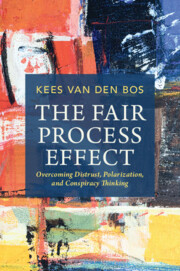Book contents
- The Fair Process Effect
- The Fair Process Effect
- Copyright page
- Contents
- Preface
- Acknowledgments
- Part I Introduction
- Part II Perceiving Procedural Fairness
- Chapter 2 Criteria
- Chapter 3 Psychological Processes
- Part III The Fair Process Effect
- Part IV Examining Societal Discontent
- Part V Overcoming Societal Discontent
- References
- Index
Chapter 3 - Psychological Processes
from Part II - Perceiving Procedural Fairness
Published online by Cambridge University Press: 26 October 2023
- The Fair Process Effect
- The Fair Process Effect
- Copyright page
- Contents
- Preface
- Acknowledgments
- Part I Introduction
- Part II Perceiving Procedural Fairness
- Chapter 2 Criteria
- Chapter 3 Psychological Processes
- Part III The Fair Process Effect
- Part IV Examining Societal Discontent
- Part V Overcoming Societal Discontent
- References
- Index
Summary
Chapter 3 examines the psychological processes that are important when people are forming perceptions of procedural fairness. The psychology of perceived procedural fairness discussed here argues that quite often people start out with a general hunch that things do not feel right. Cognitive processes help us to understand how to interpret this hunch, allowing people to start forming perceptions of procedural fairness in more confident ways. Groups may facilitate this process, for example, by communicating certain frames about how to interpret what has happened and what group members should do about this. People need to know that they are making progress toward meaningful goals, and this also plays a crucial role in the formation of fairness judgments. How these psychological processes work out in institutional contexts is also important and is discussed as well.
- Type
- Chapter
- Information
- The Fair Process EffectOvercoming Distrust, Polarization, and Conspiracy Thinking, pp. 31 - 40Publisher: Cambridge University PressPrint publication year: 2023

